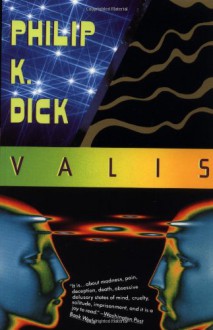Only Philip K Dick could produce a novel as comically disturbing as Valis (1981), grappling with troubled, off-sane episodes of his own life and triumphantly resolving them through SF. Early in 1974 Dick felt a "pink beam" flashing through his head, a religious experience--or mild stroke--which...
show more
Only Philip K Dick could produce a novel as comically disturbing as Valis (1981), grappling with troubled, off-sane episodes of his own life and triumphantly resolving them through SF. Early in 1974 Dick felt a "pink beam" flashing through his head, a religious experience--or mild stroke--which inspired him to write his vast theological "Exegesis". In Valis the pink beam illuminates Dick's mentally unstable friend Horselover Fat; Philip is Greek for lover of horses and Dick is German for fat. Dick's alter ego Fat duly creates the weird Gnostic theology of the Exegesis, with its visions of salvation from the insane side of reality--the Empire, whose Black Iron Prison cages us all. "The Empire never ended." Also there's a three-eyed race among us and all time between AD 103 and 1974 may be a divine illusion... The resulting debates between Fat and friends, including Dick, are often hilariously insane. It's clear that Fat is deluded--until they all see the SF movie Valis, whose rock star actor-director suggests David Bowie in The Man Who Fell To Earth and which uncannily features Exegesis code phrases, timeslips, third eyes, early Christian symbols and pink beams. Maybe the film's Vast Active Living Intelligence System, a satellite which controls minds via lasers, is the same as the messiah imagined by Fat? Naturally he and friends contact the director, leading to an unexpected interview with VALIS itself. Dick was the supreme SF master of booby-trapped reality and Valis celebrates his own escape from the trap that claimed him in 1974. Chilling, moving and acknowledged by the SF Encyclopedia as the finest novel of Dick's last years. --David Langford
show less






 6 years ago
6 years ago




 12 years ago
12 years ago